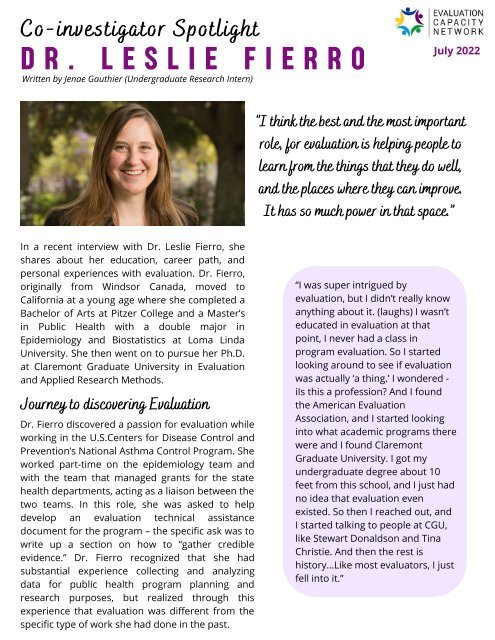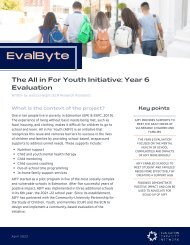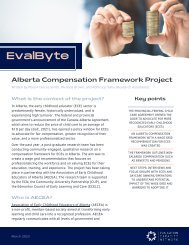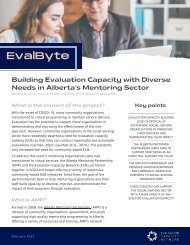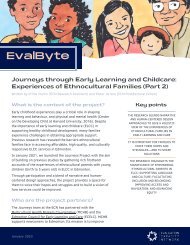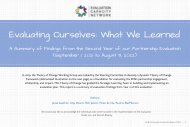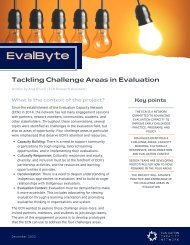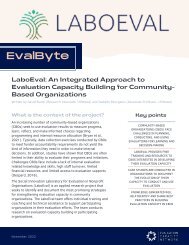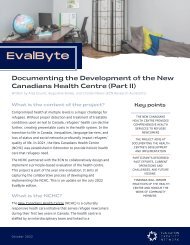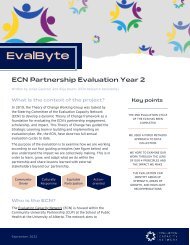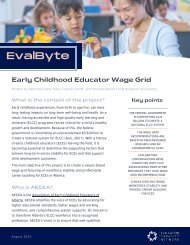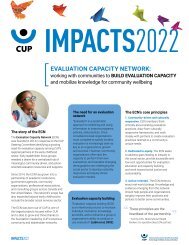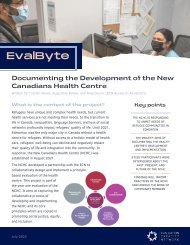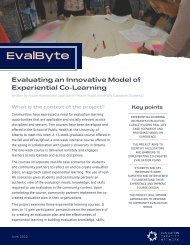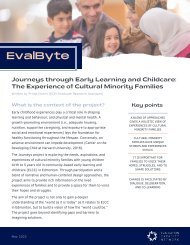Co-Investigator Spotlight: Dr. Leslie Fierro
You also want an ePaper? Increase the reach of your titles
YUMPU automatically turns print PDFs into web optimized ePapers that Google loves.
<strong>Co</strong>-investigator <strong>Spotlight</strong><br />
D R . L E S L I E F I E R R O<br />
Written by Jenae Gauthier (Undergraduate Research Intern)<br />
July 2022<br />
"I think the best and the most important<br />
role, for evaluation is helping people to<br />
learn from the things that they do well,<br />
and the places where they can improve.<br />
It has so much power in that space.”<br />
In a recent interview with <strong>Dr</strong>. <strong>Leslie</strong> <strong>Fierro</strong>, she<br />
shares about her education, career path, and<br />
personal experiences with evaluation. <strong>Dr</strong>. <strong>Fierro</strong>,<br />
originally from Windsor Canada, moved to<br />
California at a young age where she completed a<br />
Bachelor of Arts at Pitzer <strong>Co</strong>llege and a Master’s<br />
in Public Health with a double major in<br />
Epidemiology and Biostatistics at Loma Linda<br />
University. She then went on to pursue her Ph.D.<br />
at Claremont Graduate University in Evaluation<br />
and Applied Research Methods.<br />
Journey to discovering Evaluation<br />
<strong>Dr</strong>. <strong>Fierro</strong> discovered a passion for evaluation while<br />
working in the U.S.Centers for Disease <strong>Co</strong>ntrol and<br />
Prevention’s National Asthma <strong>Co</strong>ntrol Program. She<br />
worked part-time on the epidemiology team and<br />
with the team that managed grants for the state<br />
health departments, acting as a liaison between the<br />
two teams. In this role, she was asked to help<br />
develop an evaluation technical assistance<br />
document for the program – the specific ask was to<br />
write up a section on how to “gather credible<br />
evidence.” <strong>Dr</strong>. <strong>Fierro</strong> recognized that she had<br />
substantial experience collecting and analyzing<br />
data for public health program planning and<br />
research purposes, but realized through this<br />
experience that evaluation was different from the<br />
specific type of work she had done in the past.<br />
“I was super intrigued by<br />
evaluation, but I didn’t really know<br />
anything about it. (laughs) I wasn’t<br />
educated in evaluation at that<br />
point, I never had a class in<br />
program evaluation. So I started<br />
looking around to see if evaluation<br />
was actually ‘a thing.’ I wondered -<br />
iIs this a profession? And I found<br />
the American Evaluation<br />
Association, and I started looking<br />
into what academic programs there<br />
were and I found Claremont<br />
Graduate University. I got my<br />
undergraduate degree about 10<br />
feet from this school, and I just had<br />
no idea that evaluation even<br />
existed. So then I reached out, and<br />
I started talking to people at CGU,<br />
like Stewart Donaldson and Tina<br />
Christie. And then the rest is<br />
history…Like most evaluators, I just<br />
fell into it.”
Has your background in biology, epidemiology and biostatistics been helpful in<br />
some of the current positions that you hold and within the field of Evaluation?<br />
“I think those degrees have helped me with thinking about measurement and really<br />
understanding what high quality valid measures look like, and the nuances that come into play<br />
around data collection. However, they have also created some challenges for me as an<br />
evaluator. For instance, I'm not as inclined as some others in the profession to immediately<br />
think about social justice and evaluation’s role in this, I’m not as inclined to think about how<br />
people construct knowledge based upon their own realities. With biology and epidemiology,<br />
there's this idea of one truth and one way: you get at this through systematic investigation, and<br />
primarily quantitative data. So I think this heavy focus on using a technical lens was, in a sense,<br />
embedded in me through my training – as a result, it became my go to.<br />
Don’t get me wrong, methods are super important, and I keep that with me, but how do I<br />
sensitize myself to making sure that my work is culturally responsive? That I'm looking for<br />
inequities that are present? How do I make sure that I'm doing an evaluation where there's<br />
enough engagement so that it's more likely that the findings are going to be used? So I think<br />
that that's been a journey for me, and it continues to be a journey. I have to enhance my other<br />
skill set very intentionally. And sometimes that can be by virtue of making sure that I'm working<br />
with people who are more inclined to look at things from a social justice lens. So by coupling<br />
myself with members on a team who have a “go to” that is a little bit different than mine, it<br />
helps me to kind of build those muscles as well.”<br />
<br />
<strong>Dr</strong>. <strong>Fierro</strong>’s research and practice focuses on evaluation capacity building. She has examined<br />
evaluation education - specifically how individuals within the U.S. pursuing a master’s in public<br />
health are trained in evaluation . She has also explored how to measure evaluation capacity in<br />
organizations the evaluation marketplace, and, most recently, conducted research examining the<br />
development and implementation of evaluation policies in U.S. government agencies.<br />
Why is Evaluation important?<br />
“I think evaluation can be a super effective<br />
tool for learning. I understand that lots of<br />
people view evaluation as an accountability<br />
mechanism, and it's important to be<br />
accountable. It's important to be accountable<br />
for public funds… but I don't actually think<br />
that's the best role for evaluation. I think the<br />
best role and the most important role for<br />
evaluation is helping people to learn from the<br />
things that they do well, and the places where<br />
they can improve. It just has so much power<br />
in that space…”<br />
An exercise <strong>Dr</strong>. <strong>Fierro</strong> conducts with her students<br />
is to have them draw or find an image that<br />
represents evaluation (from Russ-Eft & Preskill<br />
(2004) Building Evaluation Capacity: 72 Activities<br />
for Teaching and Training). Individuals often<br />
choose images that focus on the measurement<br />
aspect of evaluation, such as sitting in front of a<br />
computer, a graph, a checklist or a ruler. They<br />
view evaluation as this detached, highly technical<br />
act that is quantitative in nature.
“We bring that technical piece to the<br />
table for sure, and hopefully some<br />
means of helping to reduce bias. But at<br />
the same time, we're doing that in the<br />
service of something. And so, it's sad to<br />
me that that's what somebody sees an<br />
evaluator as, because it couldn't be any<br />
further from what we're actually<br />
supposed to be doing, I suppose.”<br />
<strong>Dr</strong>. <strong>Fierro</strong> feels it is important to educate<br />
people to understand the learning function<br />
of evaluation. To illustrate this, she<br />
described an image of a forest with a path<br />
going through it towards light from the sun<br />
that is shining through the trees. For her,<br />
evaluation is a journey to understand<br />
something, to make improvements along the<br />
way, in order to reach the shining light at the<br />
end.<br />
“Mel Mark, Gary Henry, and George Julnes<br />
wrote a textbook on evaluation quite some<br />
time ago (Evaluation: An Integrated<br />
Framework for Understanding, Guiding, and<br />
Improving Policies and Programs (2000)) and in<br />
it they talk about the ultimate purpose of<br />
evaluation being social betterment. And I<br />
really fall in line with that. Lots of people kind<br />
of get their head wrapped around this idea of<br />
use and use being kind of like the ultimate<br />
goal of evaluations. But it's not the ultimate<br />
goal of evaluation. You want people to use<br />
information in the service of something<br />
bigger. …You want them to use the evaluation<br />
findings so they make programs and policies<br />
better, their own practices better and do more<br />
of the things that are working. And, if they do<br />
that, they will effect positive change in society<br />
that we collectively value – climate, health,<br />
education, housing, equity and so on.”<br />
Partnership with the Evaluation Capacity Network<br />
“I'm really excited about the ECN and I think it has been a great collaboration so far. It has<br />
definitely benefited my students as we've gotten to do research that we otherwise just<br />
would not have carved out time to do that I think is really going to benefit the evaluation<br />
community. It's certainly benefited each of us who's been on the team, we've learned a<br />
lot, and I think it'll help with our individual practices as well.<br />
I just want to give a shout out to ECN and particularly to Rebecca, who has continued to<br />
maintain a very rich and engaged partnership despite all of the really horrendous<br />
challenges that we've all been presented with over the last couple of years. I'm just super<br />
thankful to be part of this and I'm excited to see where we continue going with this.”
Stay Tuned for the Max Bell School of<br />
Public Policy’s Inaugural Case<br />
Challenge on Strengthening Evaluative<br />
Systems!<br />
With generous support from <strong>Dr</strong>. Sydney Duder,<br />
<strong>Dr</strong>. <strong>Fierro</strong> plans to host an evaluation case<br />
competition in late April 2023. Cross-disciplinary<br />
teams of current graduate students, and recent<br />
graduates residing in Canada or the U.S. will be<br />
tasked with solving an evaluation puzzle<br />
focused specifically on evaluation capacity<br />
building. This case challenge differs from other<br />
evaluation case competitions in that students<br />
will not be tasked with building an evaluation<br />
plan that could subsequently be used to carry<br />
out an evaluation. Rather, the teams will be<br />
presented with a situation in which there is a<br />
need to support a more robust evaluation<br />
function and they will need to create a plan or<br />
design a specific strategy for a “client” to fill this<br />
need.<br />
<strong>Dr</strong>. <strong>Leslie</strong> <strong>Fierro</strong> currently holds the inaugural<br />
Sydney Duder Professorship in Program<br />
Evaluation in the Max Bell School of Public<br />
Policy at McGill University<br />
(https://www.mcgill.ca/maxbellschool/article/a<br />
rticles/why-policymakers-need-programevaluation).<br />
In this role she teaches evaluation<br />
to passionate students who relocate to<br />
Montreal from across the globe in pursuit of a<br />
Master’s in Public Policy. <strong>Dr</strong>. <strong>Fierro</strong> is also the<br />
incoming Chair for the Max Bell School’s<br />
Equity, Diversity, and Inclusion <strong>Co</strong>mmittee.<br />
She is the <strong>Co</strong>-Editor in Chief of New Directions<br />
for Evaluation and Associate Editor of English<br />
articles for the Canadian Journal of Program<br />
Evaluation. In addition to her role as a<br />
professor, scholar and editor she engages in<br />
consulting work primarily in the area of public<br />
health evaluation and evaluation capacity<br />
building.<br />
To ensure participants are on the “same page”<br />
about evaluation, they will be offered a suite of<br />
evaluation training in advance of the case<br />
challenge and will be provided with coaching<br />
support. A panel of esteemed judges, including<br />
a representative of the entity providing the<br />
case, will provide feedback and select the<br />
winning team.<br />
The ECN is currently providing support for this<br />
case challenge through membership<br />
engagement. Specifically, alongside <strong>Leslie</strong><br />
<strong>Fierro</strong>, Isabelle Bourgeois, Rebecca Gokiert,<br />
Michelle Searle, and Melissa Tremblay comprise<br />
the planning committee for the case challenge.<br />
<strong>Leslie</strong> encourages anyone from the ECN who<br />
has an interest in the case challenge, to reach<br />
out to her or any of the planning committee<br />
members for more information.


